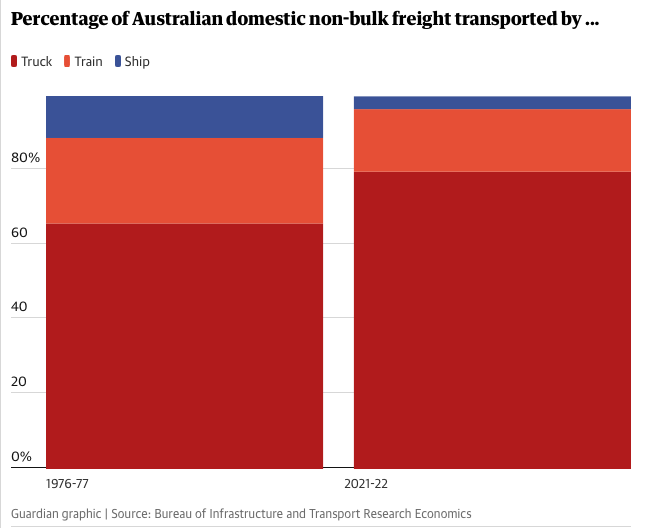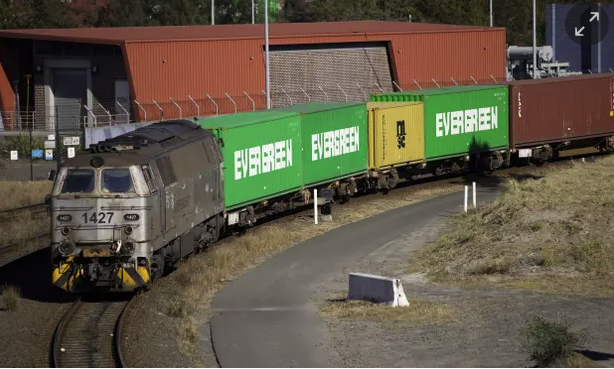Freight transported across Australia by rail has dwindled to such minuscule levels that emissions targets will be unachievable without policies to counter the country’s over-reliance on heavy and polluting trucks, the industry has warned.
The share of non-bulk freight – including manufactured goods, produce, post, foods, drinks and most other items – transported by rail in Australia has now dropped to 17% and just 11% across the eastern seaboard, according to new research released by the Australasian Railway Association (ARA) and Freight on Rail Group, a coalition of operators.
Between Melbourne and Sydney, just 2% of freight is taken by rail, the research found, down from about 40% in the 1970s, according to Bureau of Infrastructure and Transport Research Economics.
The popularity of trucking has emerged alongside underinvestment in tracks on key corridors and significant roads spending that means large B-doubles can complete some key trips faster.
The ARA and rail freight operators – which include Pacific National, Qube and Aurizon – called for targets to increase rail’s share of freight, promoting investment in rail infrastructure such as tracks, intermodal terminals and digital train controls as well as to “ease complex regulations”.
They are also calling for an increase in the heavy vehicle road charges that trucks must pay to cover the damage they cause.
Rail services are 30%-40% slower than road and the industry believes door-to-door prices – which includes transport from origin and destination to rail tracks – need to be 20%-40% lower to remain competitive with trucks.
However, the research found that for each 1% of freight shifted from truck to rail nationally, an average of $71.9m would be saved annually in terms of environmental damage, road conditions and pollution-related health outcomes. It would also reduce CO2 by an average of 330,000 tonnes.
About 700,000 B-double return truck trips are now made between Sydney and Melbourne each year, the industry estimates. It says a freight train can take as many as 41 B-doubles – which comprise a truck towing two semitrailers – off the road for each short-haul journey from a port.
While rail is still popular for bulk goods, decades of neglect has left tracks used for non-bulk freight between states in poor shape.
Last year, when flooding left key tracks closed for months, freight services from the east to the west coast were forced to reroute via Melbourne, adding 16 hours to the trip.
The underinvestment has also meant rail freight in Australia is largely fuelled by diesel, meaning the emissions benefit of moving freight off diesel-guzzling trucks is not as significant as in countries with electrified tracks.
With Australia’s freight task set to grow, the industry also wants more thorough cost-benefit analysis methods to be applied when assessing freight options, to more truly reflect the hidden social, environmental and health costs of trucking.
“The growing demand ahead cannot be met by maintaining the status quo,” the report said. “For too long, initiatives to move more freight on rail have been frustrated by policy settings that limit rail freight productivity and efficiency, and underutilised the significant advantages rail has to offer.

“This is no longer an acceptable option for the Australian economy and community … As we look to a net zero future, we must make significant, meaningful changes to the way we operate to meet emissions reduction targets and create a sustainable freight network.”
Caroline Wilkie, the ARA chief executive, said “our freight task is significant and growing and we need a resilient, reliable and efficient national rail freight network to support the economy and community”.
Michael Caltabiano, the National Transport Research Organisation CEO, said “increased use of freight rail could bring great economic and environmental benefits”.
“But a lack of reliable infrastructure, inadequate focus on productivity and inconsistent standards and regulations across the continent are preventing this,” he said.
Source: The Guardian


Shameful and wrong where is the federal government?
MIA and too busy tossing tax payer money overseas that can put to use in Australia….
125 million if I recall right is going to a war overseas which none of our business!!!
We not in a position of strength and they get our country back in order first before helping others….